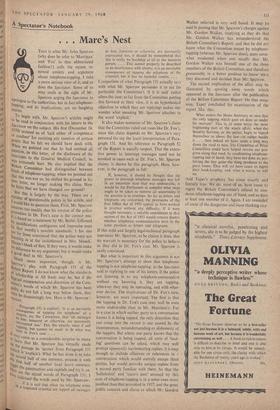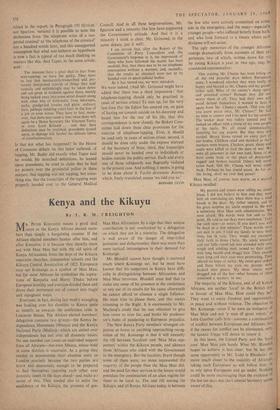A Spectator's Notebook
Mare's Nest
THAT is what Mr. John Sparrow (why does he refer to `Marrinan and `Fox' in that abbreviated fashion?) calls the recent te- newed anxiety and argument about telephone-tapping. I take a more serious view of it, and so does the Spectator. Some of us may smile at the sight of Mr.
IS
aY
in or Lid .11 in, ,. if on ,of ise Ise .ty, 3n. y, if be old ive, is ;Ltd; ige )1e,, the re. 1 the be ef⢠air `i no t ing
a
3 '111
YaS
h.
101 jeJ 1:11 apologise Sparrow urging the Spectator to ise to the authorities, but in fact telephone- tapping, and its implications, are no laughing matter.
To begin with, Mr. Sparrow's articles ought to be read in conjunction with his letters to the SPectator on the subject. His first (December 18, 1959) accused us of 'lack either of competenze or candour' for omitting any mention of certain Points that he felt we should have dealt with. When we pointed out that lie had omitted all mention, in this letter, of the disclosure of the intercepts. to the General Medical Council, he was extremely hurt. He also implied that the Birkett Committee had distinguished between kinds of telephone-tapping; when we pointed out that this was not so, he shifted his ground in his next letter, no longer making this claim. Now he hints that we have changed our ground! But this is largely by the way. There are a number of questionable points his article, and I would like to question them. First, Mr. Sparrow assumes too readily that his version of the police P. rocedure in Dr. Fox's case is the correct one.' It is based on a statement by Mr. Butler, followed by qualifications ambiguous and imprecise even by that worthy's notable standards; 'I for one a, far from convinced that the police were not listening in at the switchboard in Mrs. Monck- m no block of fiats. If they were, it would make 70 difference to my argument; but it would make a good deal to Mr. Sparrow's. s Much more, important, though. is Mr. BPa,1.°%v's play with Paragraph 151 of the i oi'ett Report. I do not know what the standards scholarship at All Souls may be, but if the 4.81.41t misquotation and distortion of the Corn- ,snm. ees words of which Mr. Sparrow has been 81111tY do not fall a long way below them, they cost be disquietingly low. Here is Mr. Sparrow"; rsion: Paragraph 151 is explicit: 'It is an inevitable sussequence of tapping the telephone' of a ;IlsP,eet, say the Committee, that 'all messages nim, innocent or otherwise, are necessarily intercepted too.' This fits exactly what I call taPPing but cannot he made to fit what was done one in Fox's case. . I nay . '-ome as a .considerable surprise to many up earn that Mr. Sparrow has virtually made (k the passage he 'quotes' from Paragraph 151 the 'eh is 'explicit). What he has done is to take the second half of one sentence, precede it with ju first half of. another (and later) sentence. 1:,,81e the punctuation and capitals and try it on. hate italicised the words used by Mr. Sparrow : ⢠if it is said that when the telephone wires of a suspected criminal are tapped all messages to hint, innocent or otherwise, are necessarily intercepted too, it should be remembered that this is really no hardship at all to the innocent person. . . . This cannot properly be described as an interference with liberty; it is an inevitable Consequence of tapping the telephone of the criminal; but it has no harmful results. . . .
Comparison of what Paragraph 151 actually says with what Mr. Sparrow persuades it to say (in particular the Committee's If it is said' rather alters the case; so far from the Committee putting this forward as their view,. it is an hypothetical objection to which they are replying) makes one wonder what meaning Mr. Sparrow attaches to the word 'explicit.'
It also makes nonsense of Mr. Sparrow's claim that the Committee ruled out cases like Dr. Fox's, since this claim depends on Mr. Sparrow's very personal (to say the least) interpretation of Para- graph 151. And his reference to Paragraph 52 of the Report is equally suspect. That the execu- tive power to intercept messages need" not be invoked in cases such as Dr. Fox's, Mr. Sparrow claims, is shown by this paragraph. Here, how- ever, is the paragraph in full: . ⢠If, however, it should be thought that the power to intercept telephone messages was left in an uncertain state that was undesirable, it would be for Parliament to consider what steps ought to be taken to remove all uncertainty if the practice is to continue. So far as letters and telegrams are concerned, the provisions of the Post Office Act of 1953 appear to have worked in practice" without any difficulty. If it were thought necessary, a suitable amendment to that section of the Act of 1953 would remove doubts whether telephonic communication were 'in the same position as letters and telegrams.
If this mild and largely legal-technical paragraph convinces Mr. Sparrow, as he claims it does, that no warrant is necessary for' the police to behave as they did in Dr. Fox's case, Mr. Sparrow is easily convinced.
But what is important in this argument is not Mr. Sparrow's attempt to show that telephone- tapping is not telephone-tapping; as the Spectator said in replying to one of his letters, if,the police are listening in to my telephone-conversation without my knowing it, they are tapping. wherever they may be operating, and with what- ever device. The implications of Dr. Fox's case, however, are more important. The first is that the tapping in Dr. Fox's case may well be even more undesirable than in Mr. Marrinan's. For in a case in which neither party to a conversation knows it is being tapped, the only 'distortion that can creep into the record is one caused by the incompetence, misundertsanding or dishonesty of the tappers. But where one party knows that the conversation is being tapped, all sorts of `lead- ing' questions can be asked, which may well prompt apparently incriminating replies; it is easy enough to include allusions or references in conversation which would entirely escape third parties. but would provoke unique replies from a second party familiar with them. .So that the `hullabaloo' and `mare's nest' aroused by this case of telephone-tapping is in a sense even more justified than that provoked in 1957, and the great public concern and alarm to which Mr. Gordon Walker referred is very well based. It may be said in passing that Mr. Sparrow's charges against Mr. Gordon Walker, implying as they do that Mr. Gordon Walker has misunderstood the Birkett Committee's Report, and that he did not know what the Committee meant by telephone- tapping (whereas Mr. Sparrow does), seem some- what weakened when one recalls that Mr. Gordon Walker was himself one of the three members of the Birkett Committee, and therefore presumably in a better position to know whit they discussed and decided than Mr. Sparrow. The second implication of the affair may be illustrated by quoting some words which appeared in the Spectator after the publication of the Birkett Committee Report. On that occa- sion, Taper concluded his examination of the report like this: What makes the Home Secretary so sure that the only tapping which goes on does so under his warrant? This is, iii some ways, the most frightening part of the whole affair; when the Security Services, or the police, begin to regard themselves as above the lawâor rather beside it . . . then indeed we have come a long way down the road to ruin. The Committee of Privy Councillors could have helped reverse our pro- gress along that road, by condemning telephone- tapping.out of band; they have not done so, pre- ferring the tiny gains the thing produces to the great losses. They will yet have cause to regret their book-keeping; and, what is worse, so will we.
And Taper's prophecy has come exactly and literally true. We do, most of us, have cause to regret the Birkett Committee's refusal to con- demn telephone-tapping out of hand, and so does at least one member of it. Again, I am reminded of some of the dangerous and loose thinking con- tamed in the report; in Paragraph 151 (Urtext, not Sparrow, version) it is possible to note the declension from `the telephone wires of a sus- pected criminal' to 'the telephone of the criminal' not a hundred words later, and this unsupported assumption that what was hitherto an hypothesis is now a fact is typical of too much thinking on matters like this. And Taper, in the same article, said : - The innocent have a gileat deal to fear from wire-tapping; so have the guilty. They have to fear that inaccurately-transcribed and per- versely interpreted records of things they said casually and unthinkingly may be taken down and not given in evidence against them, merely being tucked away into some secret dossier along with other bits of tittic-tattle from informers, narks, grudge-fed loonies and plain, ordinary liars, perhaps resulting years later in the loss of a job or even worse. They have to fear, more- over, that there may come a time when there will again be a Home Secretary like Viscount Tenby
or even Lord Kilmuir . and that then definitions may be stretched, precedents leaned upon, to damage still further the delicate fabric of constitutionalism.
Is that not what has happened? In the House of Commons debate on this latest outbreak of tapping, Mr. Butler did exactly what Taper said he would. He stretched definitions, he leaned upon precedents; he tried to claim that he had no powers over the provincial police in these matters, that tapping was not tapping, but some- thing else, that the transcripts of the tapping were properly handed over to the General Medical Council. And in all these tergiversations, Mr. Sparrow and a minority like him have supported the Government's attitude. And that it is a minority I think is clear. Mr. Grimond, in the same debate, put it well: I am certain that, after the Report of the Committee of Privy Councillors and the Government's response to it, the impression of those who have followed the matter has been twofold; first, that there was to be no telephone interception without a warrant; and, secondly, that the results so obtained were not to he handed over to quasi-judicial bodies.
As it has turned out, we were mistaken.
We were indeed. (And Mr. Grimond might have added that there was a third impression : that telephone-tapping should only be practised in cases of serious crime.) To sum up, for the very last time (for the Editor has assured me, on pain of having me commit suicide on his doorstep and haunt him for the rest of his life, that this correspondence is now closed), the Birkett Com- mittee laid down three clear provisions for the exercise of telephone-tapping. First, it should be used only in cases of serious crime; second, it should be done only under the express warrant of the Secretary of State; third, that transcripts should never be handed over to individuals bodies outside the public service. Each and every one of those safeguards was flagrantly violated in the present case. And nothing, it seems, is going to be done about it. Facilis descensus Averno, which, freely translated, means 'we told you so.'
BERNARD LEVIN







































 Previous page
Previous page